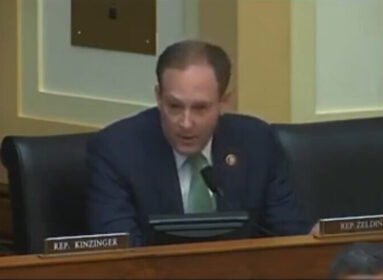By Jacob Kamaras / JointMedia News Service ~
NEW YORK—Former Israeli Prime Minister Ehud Olmert told the crowd at the Jerusalem Post Conference held in New York City on Sunday, April 29 that he didn’t “want to walk into a minefield,” but that didn’t stop one audience member from comparing him to British prime minister Neville Chamberlain, known for the infamous signing of the 1938 Munich Agreement with Adolf Hitler.
As the boos intensified throughout his speech, Olmert’s provocative remarks included a contention that Israel shouldn’t need to gain recognition as a Jewish state from the Palestinian state during peace negotiations. It is too easy to “throw the ball to the other side” by demanding such recognition, he said, calling that an excuse for the failure of the peace process.
Olmert said Israel should not engage in a peace process that includes “lip service” and the repetition of “empty slogans,” a statement representing one of what Dr. Alan Mazurek, an Zionist Organization of America (ZOA) activist, called Olmert’s “thinly-veiled attacks” on Benjamin Netanyahu’s government.
The former prime minister also posed the question of whether having a neighborhood such as Abu Dis in Jerusalem is “worth the energy” of Jews who fight for it, asking “Is it that part of Jerusalem that Jews were praying for, for 2,000 years?”
Currently, Abu Dis is under joint Israeli-Palestinian control, meaning that Olmert’s statement “clearly called for the division of Jerusalem,” according to Mazurek.
“This is part of Jerusalem,” Mazurek said. “If you’re going to negotiate, you don’t negotiate in advance, you negotiate at negotiations. You don’t give up unilaterally part of the holy city of Jerusalem.”
On Iran, Olmert laid out a three-part question: “What needs to be done? Who should do it? When should it be done?” He said the Iranian nuclear threat is primarily the responsibility of the international community — led by the U.S., not Israel.
Israel’s conversations with the U.S. and the international community on Iran should be conducted with “quieter tones,” Olmert said, consisting of sharing concerns privately rather than being seen as “giving orders” to a “powerful friend” like America. There is enough time to try “different avenues of pressure” on Iran without a direct military confrontation, Olmert said.
Israeli Minister of Environmental Protection Gilad Erdan, whose speech followed Olmert’s, countered that Israel “must always be masters of our own destiny” and that the only way to stop Iran is to make the country believe that the “military option is on the table, and we aren’t just talking.”
“The conflict with the Palestinians won’t be solved only with a pencil line drawn on a map,” Erdan said. “Palestinian refusal to recognize Israel is the heart of the conflict.” Deputy Foreign Minister Danny Ayalon also gave his take on the peace process during remarks to the audience, saying that Israel has mistakenly allowed the Palestinian narrative to garner too much attention over the years.
“Israel was not established 64 years ago,” Ayalon said. “It was established 4,000 years ago.” Israeli governments, both on the left and the right, have been lax in pointing that out.”
For peace to materialize, Israel needs to see the Palestinian Authority teach peace and recognition, but now all the PA teaches is “that all the land is theirs, that we are crusaders,” Ayalon said.
When it comes to Iran, there is “no half-pregnancy,” Ayalon said, meaning the regime should not be allowed to enrich any uranium whatsoever.
Asked during a panel discussion about what lessons he learned after Mahmoud Abbas rejected his offer of virtually all of the West Bank and part of Jerusalem in 2008, Olmert said he is “not judging Abu Mazen” and will not specifically blame either Israel or the Palestinians for the failure of the peace process. Israeli ministers, Olmert added, discouraged Abbas from accepting its peace plan.
Columnist Isi Leibler, former head of the Australian Jewish community, said during a different panel discussion that it was unfortunate to see Olmert use “everything in the book” to be divisive at the conference and criticize the Israeli government to the extent that he did.
“There’s a lot we have to learn about a certain amount of restraint and dignity,” Leibler said.
Erdan closed his address at the conference by calling on President Obama to grant clemency to Jonathan Pollard, who is serving his 27th year in U.S. prison after being convicted of spying for Israel. Jerusalem Post Editor in Chief Steve Linde agreed, saying, “We certainly echo and support his appeal.”
Pollard’s advocates say his life sentence is disproportionate to his crime. Leibler said at the conference, “It is one of the greatest scandals of Diaspora Jewry that Pollard is still in jail. It is an absolutely unspeakable situation… we’ve got to shout more and more and more,” Leibler said.
SHARE







 Southern New England Jewish Ledger
Southern New England Jewish Ledger













